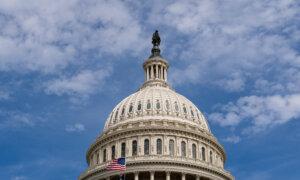‘The level of regulatory activity under the Biden administration has been immense,’ said Dan Goldbeck, director of regulatory policy, American Action Forum.
A 15-month congressional investigation into America’s growing regulatory burden has revealed that the cost of the over 900 final rules adopted under President Joe Biden has eclipsed that of any prior administration and is causing America’s small business to suffer.
“This 15-month long investigation conducted by our Committee demonstrates how federal agencies are not living up to the letter or spirit of the RFA,” House Committee on Small Business Chairman Rep. Roger Williams (R-Texas) said in a statement. “This law was intended to act as a shield against the heavy hand of government for Main Street America, but it is not functioning as it should and needs to be significantly improved.”
The RFA, which was enacted in 1980, requires federal agencies to consider the impact of their one-size-fits-all regulatory proposals on small businesses and other similar organizations, in a bid to protect America’s business community from heavy-handed government and burdensome regulations.
The last major update to the RFA was 25 years ago and, since that time, the administrative state has grown much bigger—as has the regulatory burden on small businesses.
The committee’s investigation into the RFA and its use has led the panel to conclude that the law is not working as intended and needs to be drastically improved, and that federal agencies “constantly” fail to comply with it, “causing small businesses to suffer.”
“The massive number of regulations that federal agencies pass each year and the resulting paperwork hours illustrate how detrimental an unchecked regulatory regime can be on small businesses,” the report notes. “Under the Biden Administration, this regulatory state has gotten dramatically worse.”
The White House did not respond to a request for comment.
‘Something Has to Give’
In assessing the overall impact of the regulatory burden, the committee found that the Biden administration’s rules have cost a disproportionately high amount compared to prior administrations.
The report indicates that, since President Biden took office through May 3, 2024, his administration has issued 891 final rules, entailing 232.2 million paperwork hours and imposing final rule costs of $1.47 trillion.
Some experts say the regulatory cost is even higher.
Dan Goldbeck, director of regulatory policy at the American Action Forum (AAF), said during a May 22 congressional hearing that the “unprecedented” level of regulations under the Biden administration has, since early May, risen to 930 final rules at a cost in excess of $1.6 trillion.
“A sizeable portion of these costs was finalized in only the past few weeks,” Mr. Goldbeck said. “The level of regulatory activity under the Biden administration has been immense.”
Mr. Goldbeck said that the scale of the $1.6 trillion figure was even more jarring when set against that of the two immediately preceding administrations.
The Biden administration’s current final rule cost total is more than five times greater than that accumulated through this point under President Barack Obama.
By contrast, under President Donald Trump, the final rule costs were a net negative $159.9 billion, according to Mr. Goldbeck’s calculations, meaning that the final rules adopted under the Trump administration actually reduced the overall regulatory burden.
In his testimony, Mr. Goldbeck pointed to a number of “deficiencies” in the RFA process and, much like the committee report, highlighted the need for change.
“Administrative agencies have figured out how to bypass the law’s requirements, take advantage of loopholes, and engage in faulty cost analyses,” he testified on May 22.
“Each new regulatory burden compounds and layers on top of the existing regulatory requirements, until the pressure is too much to bear,” he said. “The reality is that the current burdensome regulatory path is unsustainable, and something has to give.”
Cutting Red Tape
During its investigation, the House Committee on Small Business found a number of problems with federal agencies’ compliance with the RFA.
“Unfortunately, most agencies are failing to properly comply with the RFA’s requirements—in fact many are treating it like a check the box exercise rather than actually analyzing the effects of their regulations,” the report states.
One issue the investigation found is that federal agencies improperly certify rules in order to avoid conducting an RFA analysis, meaning that rules come into force without an adequate assessment of their impact on small businesses.
Another problem is that agencies chronically underestimate both the costs of new rules and the number of impacted small businesses, creating a chasm between what agencies claim and real-world impacts.
Agencies also routinely fail to adequately consider less burdensome rule alternatives, or simply pick those rules that have more harmful impacts on small businesses than the alternatives.
Failure on the part of agencies to consider whether proposed rules overlap or conflict with existing rules impose additional compliance troubles on small businesses is another issue that needs addressing, per the report.
Finally, some federal agencies have refused to submit to congressional oversight, the report alleges, violating the U.S. Constitution and preventing the committee from carrying out its duty to protect America’s small businesses from the regulatory onslaught.
The committee recommends amending the current RFA requirements to include stronger language and descriptions of the cumulative economic impact of the rule, as well as any disproportionate impacts on small entities, and how the rule may undercut their access to credit.
“Currently, the RFA’s language provides an exceptional amount of flexibility to agencies, using language like ’to the extent practicable‘ and ’when feasible,’” the report states.
“Change is required,” the committee report states, arguing that the current regulatory framework is insufficient to protect America’s small businesses.
Original News Source Link – Epoch Times
Running For Office? Conservative Campaign Consulting – Election Day Strategies!


